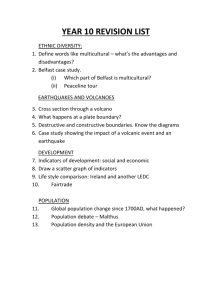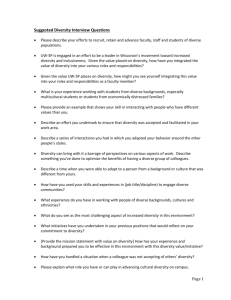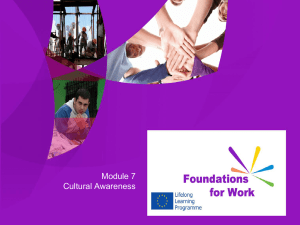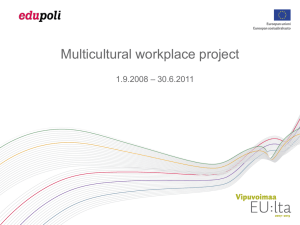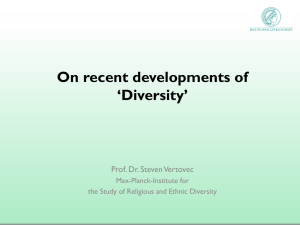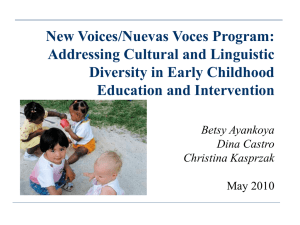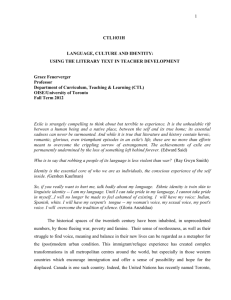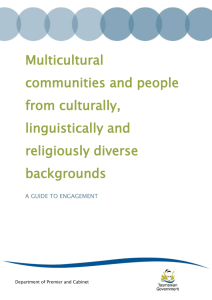Cultural Diversity and Community Relations Policy
advertisement
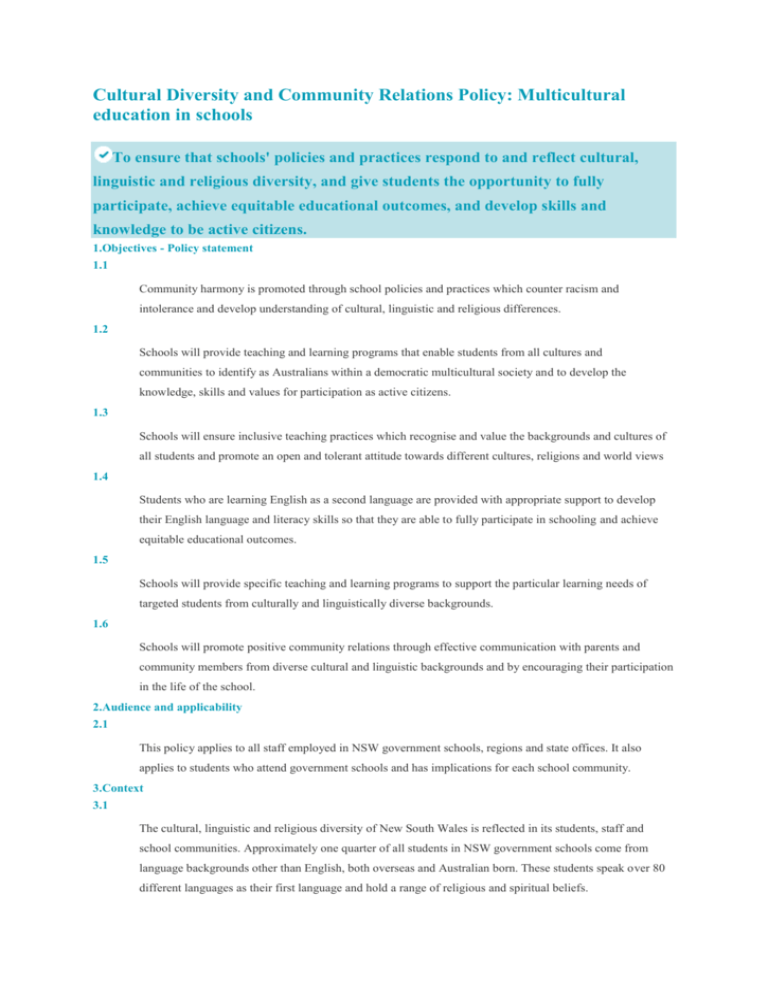
Cultural Diversity and Community Relations Policy: Multicultural education in schools To ensure that schools' policies and practices respond to and reflect cultural, linguistic and religious diversity, and give students the opportunity to fully participate, achieve equitable educational outcomes, and develop skills and knowledge to be active citizens. 1.Objectives - Policy statement 1.1 Community harmony is promoted through school policies and practices which counter racism and intolerance and develop understanding of cultural, linguistic and religious differences. 1.2 Schools will provide teaching and learning programs that enable students from all cultures and communities to identify as Australians within a democratic multicultural society and to develop the knowledge, skills and values for participation as active citizens. 1.3 Schools will ensure inclusive teaching practices which recognise and value the backgrounds and cultures of all students and promote an open and tolerant attitude towards different cultures, religions and world views 1.4 Students who are learning English as a second language are provided with appropriate support to develop their English language and literacy skills so that they are able to fully participate in schooling and achieve equitable educational outcomes. 1.5 Schools will provide specific teaching and learning programs to support the particular learning needs of targeted students from culturally and linguistically diverse backgrounds. 1.6 Schools will promote positive community relations through effective communication with parents and community members from diverse cultural and linguistic backgrounds and by encouraging their participation in the life of the school. 2.Audience and applicability 2.1 This policy applies to all staff employed in NSW government schools, regions and state offices. It also applies to students who attend government schools and has implications for each school community. 3.Context 3.1 The cultural, linguistic and religious diversity of New South Wales is reflected in its students, staff and school communities. Approximately one quarter of all students in NSW government schools come from language backgrounds other than English, both overseas and Australian born. These students speak over 80 different languages as their first language and hold a range of religious and spiritual beliefs. 3.2 The Community Relations Commission and Principles of Multiculturalism Act (2000) recognises and values the different linguistic, religious and ethnic backgrounds of the people of New South Wales. It also promotes the equal rights and responsibilities of all the people of the state within a cohesive and harmonious multicultural society in which diversity is regarded as a strength and an asset, individuals share a commitment to Australia and English is the common language. 3.3 Under the Act, the Community Relations Commission For a multicultural NSW (CRC) is legislated to act across government and across the whole community to promote and foster social harmony, and to maximise the benefits of cultural diversity. 3.4 The Principles of Multiculturalism provide the framework for the implementation of the Cultural Diversity and Community Relations Policy: All individuals in New South Wales should have the greatest possible opportunity to contribute to, and participate in, all aspects of public life in which they may legally participate. All individuals and institutions should respect and make provision for the culture, language and religion of others within an Australian legal and institutional framework where English is the common language. All individuals should have the greatest possible opportunity to make use of and participate in relevant activities and programs provided or administered by the Government of New South Wales. All institutions of New South Wales should recognise the linguistic and cultural assets in the population of New South Wales as a valuable resource and promote this resource to maximise the development of the State. 3.5 Document history and details 4.Responsibilities and delegations 4.1 The Director-General is responsible for ensuring that the Department’s policies and procedures are consistent with the Principles of Multiculturalism through the implementation of the Cultural Diversity and Community Relations Policy in schools, regions and state offices. 4.2 Regional directors are responsible for ensuring the implementation of the policy in schools and regions through including strategies for multicultural education in regional plans. 4.3 Principals are responsible for ensuring that school policies, practices and teaching and learning programs are consistent with the policy and for including relevant strategies for multicultural education in school plans. 4.4 The Director of Equity Programs and Distance Education, as policy owner, is responsible for publication and currency of the policy and support material. 4.5 The Manager of Multicultural Programs, as policy contact person, is responsible for provision of advice on the interpretation and implementation of the policy and support material. 5.Monitoring, evaluation and reporting requirements 5.1 The Department of Education and Training will report progress in implementing the Cultural Diversity and Community Relations Policy through the Department’s Annual Report. 5.2 Equity Programs and Distance Education Directorate, through the Multicultural Programs Unit, will monitor the implementation of the policy and coordinate reporting on outcomes achieved in multicultural education through the Department’s annual Ethnic Affairs Priorities Statement (EAPS) report. 5.3 Planning and Innovation Directorate, through the Data Collection and Reporting Unit, will report annually on numbers of students from language backgrounds other than English in government schools. 5.4 Regions will report annually on outcomes achieved through their regional reports and Ethnic Affairs Priorities Statement (EAPS) reports. 5.5 Schools will report annually on achievements in multicultural education in their school reports. 6.Contact Manager, Multicultural Programs 02 9244 5412
